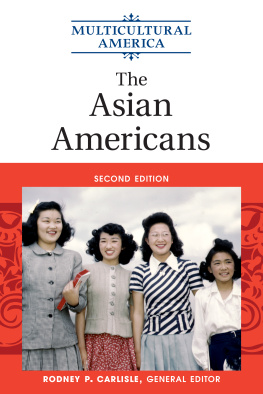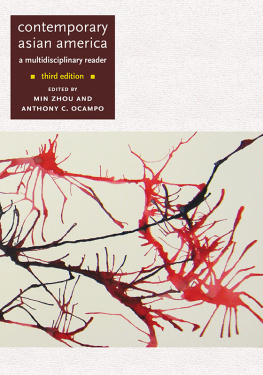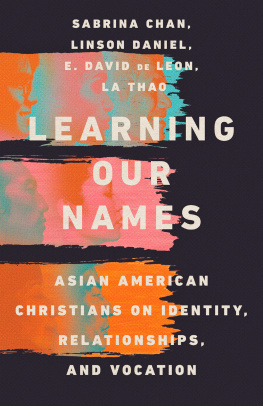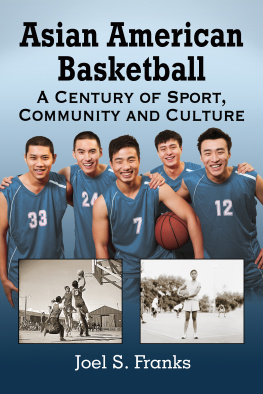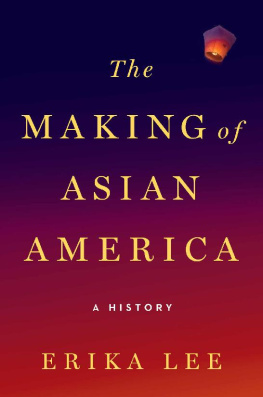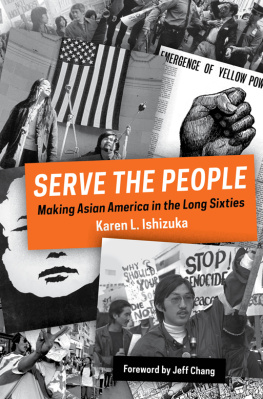Published in 2003 by
Routledge
Taylor & Francis Group
711 Third Avenue
New York, NY 10017
Published in Great Britain by
Routledge
Taylor & Francis Group
2 Park Square
Milton Park, Abingdon
Oxon OX14 4RN
Copyright 2003 by Taylor & Francis Books, Inc.
Routledge is an imprint of the Taylor & Francis Group.
Cyber-Race by Jerry Kang was originally published in Harvard Law Review 113, no. 5 (2000), 11301208. Copyright 2000 by the Harvard Law Review Association.
North American Hindus, the Sense of History, and the Politics of Internet Diasporism by Vinay Lal was originally published as The Politics of History on the Internet: Cyber-Diasporic Hinduism and the North American Hindu Diaspora in Diaspora 8, no. 2 (1999), 13772. Reprinted by permission of University of Toronto Press Incorporated.
Laughter in the Rain: Jokes As Membership and Resistance by Emily Noelle Ignacio is adapted from Building Diaspora: The Formation on the Internet of a Filipino Cultural Community, forthcoming from Rutgers University Press. Used by permission.
The Revenge of the Yellowfaced Cyborg Terminator: The Rape of Digital Geishas and the Colonization of Cyber-Coolies in 3D Realms Shadow Warrior by Jeff Ow was originally published in Race in Cyberspace, edited by Beth E. Kolko, Lisa Nakamura, and Gilbert B. Rodman (Routledge, 2000), 5168. Reprinted by permission.
All rights reserved. No part of this book may be reprinted or reproduced or utilized in any form or by any electronic, mechanical or other means, now known or hereafter invented, including photocopying and recording or in any information storage or retrieval system, without permission in writing from the publisher.
Library of Congress Cataloging-in-Publication Data
Asian America.Net : ethnicity, nationalism and cyberspace / edited by Rachel C. Lee and Sau-ling Cynthia Wong.
p. cm.
Includes bibliographical references and index.
ISBN 0-415-96559-4 (hard cover : alk. paper)ISBN 0-415-96560-8 (soft cover : alk. paper)
1. Technological innovationsSocial aspectsUnited States. 2. InternetSocial aspectsUnited States. 3. CyberspaceSocial aspectsUnited States. 4. Minorities in technologyUnited States. 5. Asian AmericansCommunication. I. Lee, Rachel C., 1966 II. Wong, Sau-ling Cynthia.
T173.8 A815 2003
303.483dc21
2002153218
Preface
RACHEL C. LEE
GOLDSEA visitors are forward-looking and see themselves as among the leaders of todays America. They shape the opinions of the 12 million Asians who make up Americas fastest-growing, best-educated and most affluent consumer segment, as well as of their increasingly tech-savvy fellow Americans.
Age range: 13 to 57; Median age: 32
Median household income: $104,000
10% have $200,000+ household incomes
9% are CEOs of their own businesses
16% occupy upper- and middle-management positions
11% own their own professional practices
Male/female ratio is 48/52
Husband says hes going to Gold Mountain And doesnt listen to my pleas. In the still of the night, full of thoughts, I cannot rest my eyes Standing before the dresser alone, I face a grieving reflection I wonder.
We may become rich, but wealth is really nothing!
from Songs of Gold Mountain, trans. Marlon Hom
Cybernetics is already a paradox: simultaneously a sublime vision of human power over change and a multinationals mechanical process of expansion.
Judith Squires, Fabulous Feminist Futures and
the Lure of Cyberculture
From the Other Shore of the Y2K Gold Rush
Until the closing years of the twentieth century, both Sau-ling Cynthia Wong and I had never considered ourselves experts or even players in the field of Internet technology. Comfortable in our back-row stadium seats, we were, if not completely on the nether side of the digital divide, then teetering precariously at and that, conversely, the field of Asian American studies had yet to take into account the impact of cybertechnology on its primary object of analysis. That sense of our own Asian American lives, integrated within digital circuits but only in an unreflective (pragmatic) manner, seemed to carry over to our colleagues and friends as well. Though we could easily locate individuals who were the web technicians for specifically Asian American political and progressive newsgroups, these individuals were not necessarily interested in cyberAsian America as a research topic. Moreover, it seemed to us that the growing attention to race and cyberspace, for instance in articulations that mapped the digital divide as a racial divide, simply did not take into account the Asian American particularity to specific forms of online life, to cybermediated forms of cultural representation, and to the much-touted new economy built on micro-chips.
The compiling of this anthology on the topic of cyberAsian America, thus, represents an effort not only to discover how Asians in diaspora have thus far used the webfor instance, would Asian Americans approach the web as consumers first;but comprised of Netizens oriented toward examining and theorizing both the limit and potential for political resistance and social struggle on the net.
Practically speaking, we envision this volume to serve as a resource for those who are teaching courses in new media, cyberculture, media studies, ethnic studies, and womens studies, or have research interests regarding immigration and technology. At the same time, we think it important to note that Asian Americans remain somewhat distinct from other U.S. people of color in terms of their adoption of information technology, and in terms of the importance of late-twentieth-century U.S. software and hardware-design industries in materializing conditions for the most recent wave of Asian immigration to American shores. This distinction is only obliquely acknowledged by a number of cybercritics. On the whole, scholars in the field of race and cyberspace remain critically hesitant to emphasize Asian Americans differences from other racial groups in terms of their cyberpractices, in part due to legitimate worries over the way such claims to distinction can play into old divide-and-conquer tactics that set minorities against (model) minorities (a point further discussed in this volumes introduction). Many of our contributors share such a critical hesitation. However, as editors, we feel it necessary to broach directly, rather than bracket, the difficulties, both analytical and political, inherent in recognizing Asian Americans as minority historical subjects, though ones with a variegated relation to cyberspace.
Our editorial policy reflects the contradictions within Asian America, itself, with respect to a diversity of opinions on cyberspaces progressive possibilities or its residual militaristic and corporate structures that hardwire the Internet to further current (early-twenty-first century) modes of racism, sexism, militarism, and capitalism.are their deep engagements with theoretical debates and conceptual paradigms in their respective fields under the pressure of cyberstudies. As an anonymous reader of the volume put it, the contributors of


